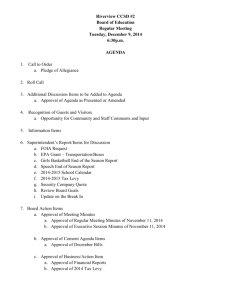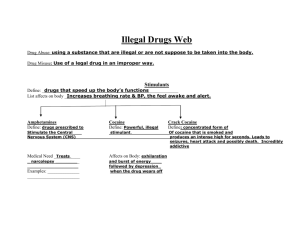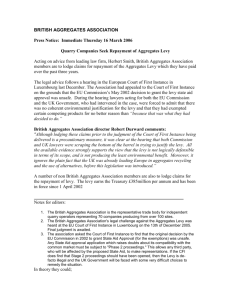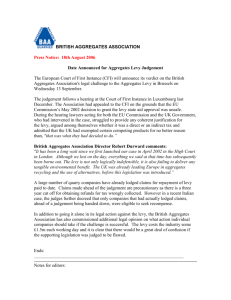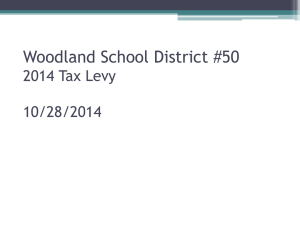Daily Telegraph 4-Oct-03 - British Aggregates Association
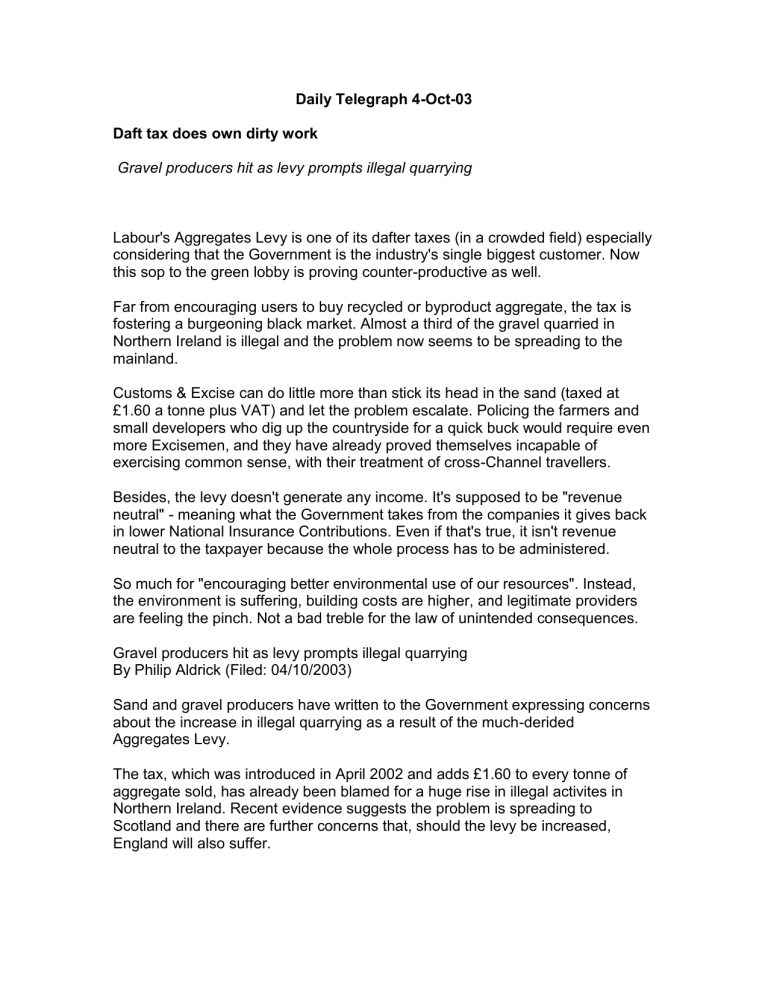
Daily Telegraph 4-Oct-03
Daft tax does own dirty work
Gravel producers hit as levy prompts illegal quarrying
Labour's Aggregates Levy is one of its dafter taxes (in a crowded field) especially considering that the Government is the industry's single biggest customer. Now this sop to the green lobby is proving counter-productive as well.
Far from encouraging users to buy recycled or byproduct aggregate, the tax is fostering a burgeoning black market. Almost a third of the gravel quarried in
Northern Ireland is illegal and the problem now seems to be spreading to the mainland.
Customs & Excise can do little more than stick its head in the sand (taxed at
£1.60 a tonne plus VAT) and let the problem escalate. Policing the farmers and small developers who dig up the countryside for a quick buck would require even more Excisemen, and they have already proved themselves incapable of exercising common sense, with their treatment of cross-Channel travellers.
Besides, the levy doesn't generate any income. It's supposed to be "revenue neutral" - meaning what the Government takes from the companies it gives back in lower National Insurance Contributions. Even if that's true, it isn't revenue neutral to the taxpayer because the whole process has to be administered.
So much for "encouraging better environmental use of our resources". Instead, the environment is suffering, building costs are higher, and legitimate providers are feeling the pinch. Not a bad treble for the law of unintended consequences.
Gravel producers hit as levy prompts illegal quarrying
By Philip Aldrick (Filed: 04/10/2003)
Sand and gravel producers have written to the Government expressing concerns about the increase in illegal quarrying as a result of the much-derided
Aggregates Levy.
The tax, which was introduced in April 2002 and adds £1.60 to every tonne of aggregate sold, has already been blamed for a huge rise in illegal activites in
Northern Ireland. Recent evidence suggests the problem is spreading to
Scotland and there are further concerns that, should the levy be increased,
England will also suffer.
Northern Ireland producers have reported a 20pc-30pc decline in trade as a direct result of illegal quarrying in 2002 despite an increase in construction activity. According to the British Aggregates Association, the black market now accounts for 30pc of Northern Ireland's product.
In a letter to Customs & Excise last week, Richard Bird, the BAA's executive officer, said 38 illegal quarries had been identified in Northern Ireland and "there are reports of illegal operations taking place in Scotland".
"The offenders are selling aggregate for £1.60 a tonne plus VAT cheaper than the rest," he said yesterday. "When you're selling a few hundred tonnes, that's good money - the levy is encouraging people to do this."
Illegal quarriers tend to be farmers or waste site developers digging without a permit - "a lot of small scale operations", Mr Bird said.
Customs operates a task force of Aggregates Levy officers but can not police the growing menace effectively, the association claims. A Customs spokesman dismissed concerns about the problem in mainland UK and would not comment on Northern Ireland.
Nevertheless, David Knight, head of environmental taxes at Customs, last week pledged to end the "light touch" approach employed in the first year.
The levy was intended to encourage environmental practices by making recycling and byproduct aggregate cheaper. However, the Quarry Products Association has claimed that it has "caused severe environmental damage to some of
Northern Ireland's leading tourist areas" through illegal quarrying.
The tax has also been criticised because the biggest user, with 40pc of the output, is the Government itself on public infrastructure products. Fears that the tax would be raised to £2.50 a tonne this year were unfounded but still persist.
Mr Bird said: "If the Government puts it up by another £1, then the problem will spread to England. Once the word gets out that this is a toothless dog, it'll be an invitation to fraudsters."
4 March 2003: Aggregate resigned to rise in rock tax
18 March 2002: CBI seeks law delay on aggregates
